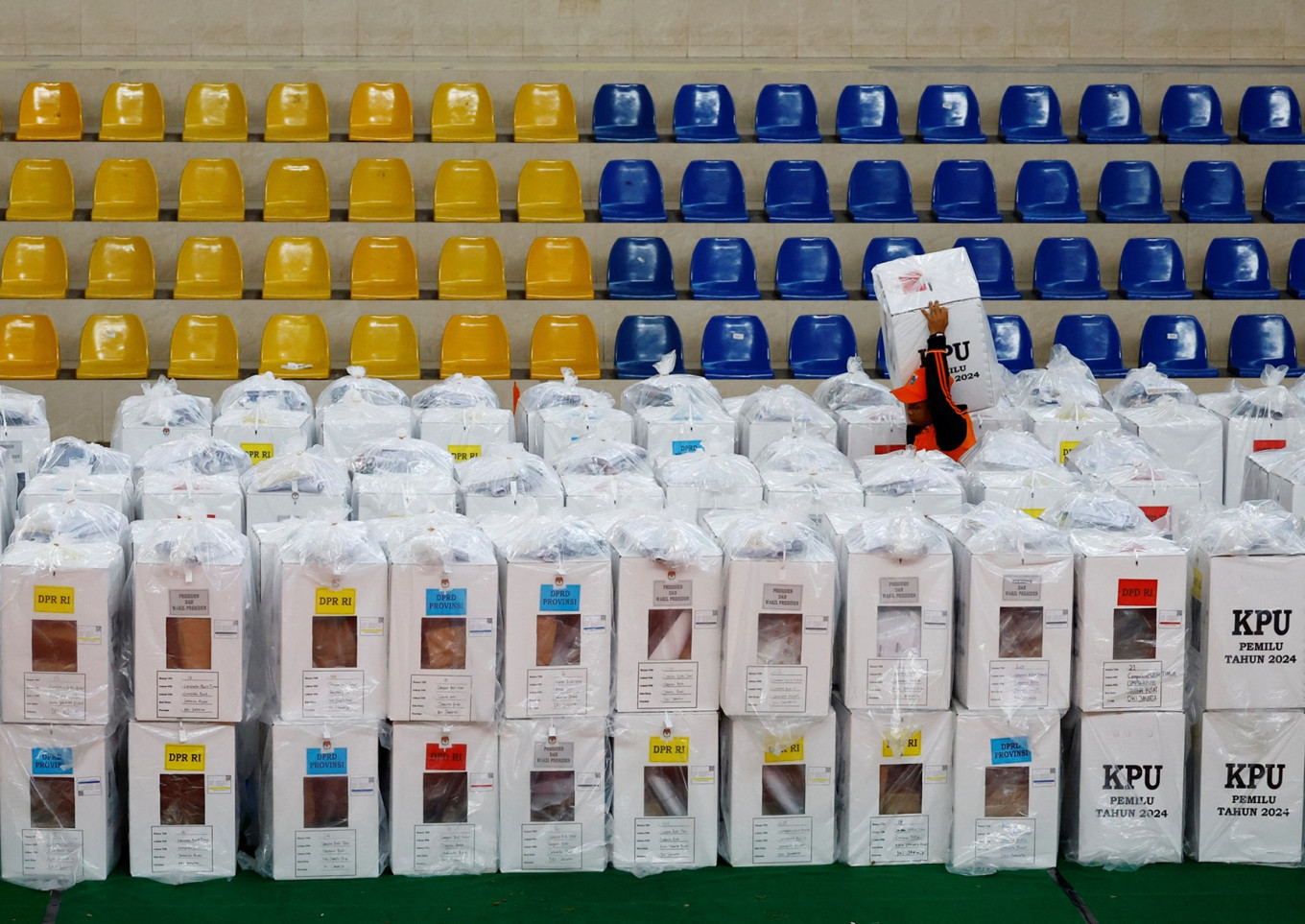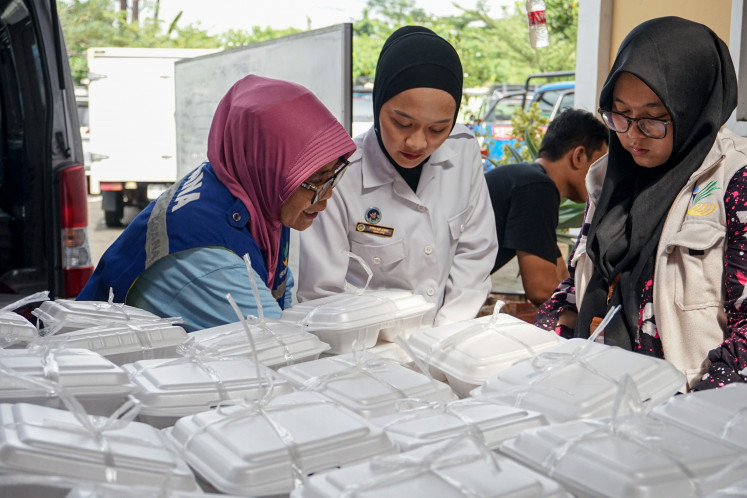Popular Reads
Top Results
Can't find what you're looking for?
View all search resultsPopular Reads
Top Results
Can't find what you're looking for?
View all search resultsTrusting democracy: Why it’s worth believing in the Feb. 14 vote
If we believe in democracy, it behooves us to give the benefit of the doubt to the vote count, and not only because of how far-fetched “The Steal” would be to actually carry out.
Change text size
Gift Premium Articles
to Anyone
“If the vote is fair, my candidate will win…” This sentiment is doubly worrying for those who care about democracy. On the one hand, it’s worrying because, if true, it means democracy is a fraud and those elections are only for show. On the other hand, the notion “if the vote is fair, my candidate will win” is equally worrying because even if that sentiment is false, this view reflects a profoundly suspicious and deeply jaded electorate.
As someone who has been visiting and studying Indonesia since the New Order, I am not naïve enough to believe that just because an election is taking place, that it is free and fair. Nearly being shot in 1997 while casually watching a Surabaya polling station disabused me of that notion. But over the decades since Reformasi, I’ve come to believe that Indonesian democracy is worth believing and believing in.
It might have something to do with the privilege I’ve had of working with some of Indonesia’s most influential students, scholars and politicians in my position at Northern Illinois University. It is also influenced by the colleagues I have worked closely with in the Indonesian General Elections Commission (KPU), the Secretariat of the House of Representatives and other government agencies. But mostly, I think it comes from understanding how voting actually takes place in Indonesia and it makes me wonder if those who espouse the conspiracy theory of the vote being stolen have truly examined the full measure of what they are saying.
For those alleging voter fraud, well in advance of any voting even taking place, I would ask this, how would “The Steal” work exactly? Please take me through it from the ground up, because here is what “The Steal” is up against.
There are some 204.6 million eligible Indonesian voters who might show up today at 823,220 polling stations in a six hour span. Averaging a very manageable 250-300 voters per station, voters must appear on that particular voting roll and must show government-issued ID cards to verify.
Then on this, the single largest day of voting in world history, hundreds of millions will walk alone into private voting booths and manually punch their ballots. They will then drop those ballots into a ballot box, in public, and dip their finger in indelible ink, basically making it impossible to vote twice.

But that’s not all “The Steal” is up against. The KPU stations a minimum of seven poll workers per polling station, a staggering total of more than 5.74 million poll workers on election day across the country. Add to these millions of vigilant KPU eyes on the process, a host of others will be there watching with eagle-like focus.
In addition to KPU there is the Election Supervisory Agency (Bawaslu), the democracy watchdogs and ad hoc staff, whose job it is to detect and call out infractions. The polling stations are also open to party representatives, NGOs, polling agencies and quick counters, foreign and domestic election monitors, media and interested citizens in a country celebrating voting as a national holiday.
Dozens of eyes all trained on each ballot box as precincts count the votes in full public view. On election day there may conservatively be 16.5 million people invested in running and monitoring these elections. All of them standing in the way of “The Steal”.
You still think “The Steal” is possible? How would it work exactly? Are nearly six million poll workers being paid off, being threatened or are cheating out of conviction? What about Bawaslu people whose full time job and passion it is to safeguard the process-are they somehow all in on “The Steal”?
How about party members, if “The Steal” is real, wouldn’t they love to hand over reams of cheating evidence (if it in fact exists)? All Media and NGOs are somehow on board? Elections are hours away so this would already have been set in motion long ago. Everyone has a cellphone, every can easily document and share. Where is all this clear and damning evidence of “The Steal”?
The truth is that there is no evidence of widespread or even minimal voter fraud. What there is in abundance are rampant rumors and speculation. When I hear these rumors, I ask about polling data. “Polls and pollsters are also rigged!” is the most common response. Really?
Scores of foreign and domestic careful academics from reputable polling agencies are also in on “The Steal”? What becomes clear is that there are an alarming number of people who would rather traffic in rumor than evidence. Tribalism and passion trumps reason. Dogma over data.
Finally I would say, if we believe in democracy, it behooves us to give the benefit of the doubt to the vote count, and not only because of how far-fetched “The Steal” would be to actually carry out.
This vote deserves the benefit of the doubt because of the generational disengagement with democracy that sowing distrust in voting may bring. I remember the wild and fantastical assertions of voter fraud after the November 2020 United States presidential elections. None of those claims turned out to be true, but that didn’t matter to a radical angry base whose leaders fanned the flames until it exploded into violence on Jan. 6, 2021.
I watched with disbelief as mobs of insurrectionists stormed the US Capitol, attempting to overthrow democracy and hang our political leaders. Wide swaths of the US electorate now operate in post-truth political silos and may never again believe in democracy.
Indonesia deserves better. No country has had a more challenging path to democracy, and it will serve as a beacon to emerging democracies worldwide and backsliding democracies in its backyard. Decades of authoritarian rule, Cold War subversion as foreign policy against it, the world’s most diverse and sprawling electorate and yet it’s come this far, an open society that demonstrates that democracy can in fact deliver progress.
And finally, “Indonesia” isn’t an ethnicity, it’s an idea. Initially forged from brutal colonial rule, Indonesia united in opposition to imperialism to win independence. Indonesia had no choice but to stay together under authoritarian rule but choose again, as it did in 1945 to voluntarily hang together through Reformasi.
It’s worth giving this vote a chance, because democracy is now central to what it means to be Indonesian.
***
The writer is a professor of history and executive director of Global Initiatives, Northern Illinois University (instagram @iloveroti).










